filtration system solenoid valve: essential component for efficient filtration processes
Release time:2025-04-20 20:17:43
In modern industrial applications, ensuring the cleanliness and quality of liquids and gases is a critical aspect of maintaining operational efficiency. Filtration systems play a vital role in this process, and one essential component that enhances their performance is the solenoid valve. A Filtration System Solenoid Valve is an automated valve used in filtration systems to control the flow of fluids through the filters. By automating the filtration process, these valves help optimize the filtration systems' performance and ensure the purity of the fluid being processed.

What is a Filtration System Solenoid Valve?
A solenoid valve is an electromechanical device that uses an electric current to control the opening and closing of a valve. In the context of filtration systems, these valves are used to regulate the flow of liquids or gases in response to the needs of the filtration process. They play a crucial role in automating the filtration system, helping to filter contaminants from fluids without manual intervention.
Typically, a solenoid valve consists of two main parts: the solenoid coil and the valve mechanism. When an electric current is applied to the solenoid coil, it generates a magnetic field that causes the valve mechanism to open or close, controlling the flow of the fluid. The precise control over fluid flow provided by solenoid valves is invaluable in filtration systems, especially in applications that require continuous filtration or high levels of automation.


